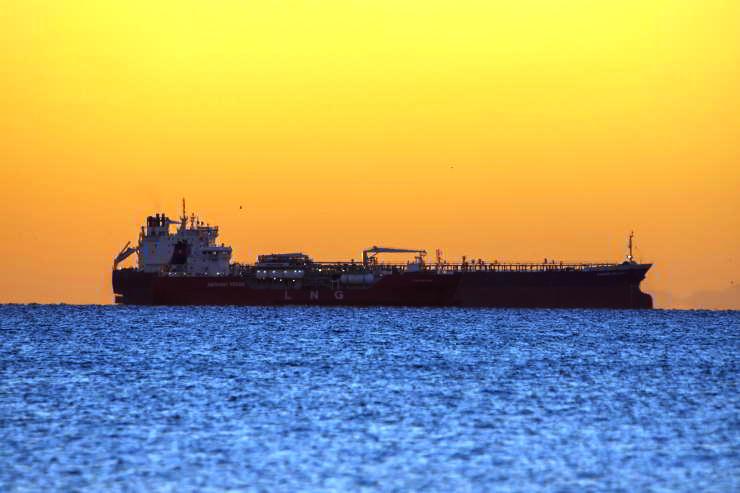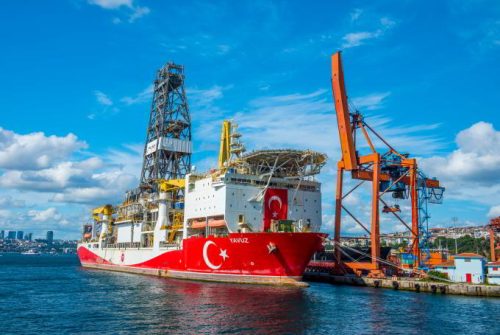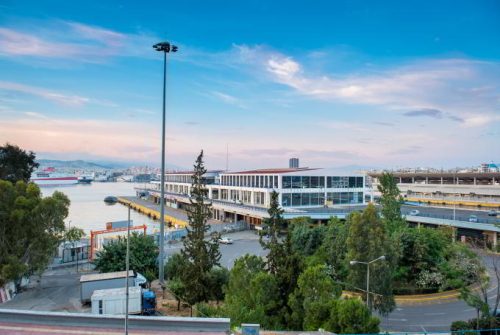The Mediterranean Sea. Global Challenges.

The phenomenon of the territorialisation of the Seas has not spared the Mediterranean area, which is increasingly restricted and at risk of crisis, with areas of high seas drastically reduced.
This situation becomes even more evident in the eastern part of the basin, which is characterised by the high level of conflict determined by the management of borders and the sharing of gas reserves. In this area, there are important gas deposits, including that of Egypt, among the largest deposits in the region, which has allowed it to satisfy its national energy needs and export gas outside the region. In addition to those of Egypt, there are also the Israeli offshore deposits, Tamar and Leviathan, thanks to which the country reaches and exceeds the national energy demand, as well as those discovered by Cyprus in front of its coasts which hold significant quantities of gas.

Istanbul. Turkish Drillship is moored at Haydarpasa Port. The Yavuz ship is owned by the Turkish Petroleum Corporation (TPAO). Erdogan signed a memorandum of understanding with Libya for the definition of a maritime corridor between the two countries. 123rf
The presence of these deposits and the untapped potential of the underwater dimension have pushed coastal states, over the last twenty years, to stipulate territorial delimitation agreements that are at the root of the tensions present in the area. More specifically, Cyprus stipulated agreements with Egypt, in 2003, Lebanon in 2007 and Israel in 2010, aimed at managing the natural resources around the island, ignoring, however, any legal and legitimate rights of the Turkish part in the north. These agreements, opening the way to explorations within its territorial waters, have aroused the ire of Turkey which, finding itself confined to its coasts, has reacted by establishing a border of the EEZ with the northern part of the Turkish Republic of Northern Cyprus.
Subsequently, in 2019, taking advantage of the difficulty of Al Sarraj being besieged by Haftar’s troops, Erdogan signed a memorandum of understanding with Libya for the definition of a maritime corridor between the two countries which, overlapping with some Greek and Cypriot EEZs, divided the Mediterranean into two compartments. This action, which changed the maritime scenarios of the Mediterranean in one fell swoop, was heavily condemned by the US, the EU and Greece, which accused Turkey of having applied the delimitation techniques in a distorted way and of not having taken into account the rights claimed by other bordering states such as Greece, Cyprus and Egypt. In response to the Turkish action a year later, in 2020, Greece signed an agreement with Egypt which, in fact, cancelled the Turkish corridor signed
by Turkey and Libya.

A ship in the Mediterranean Sea near Cyprus. Greece, Cyprus and Israel have signed an agreement that provides for the construction of the large East Med gas pipeline.123rf
The phenomenon of territorialization, however, besides the eastern part, is extending to the entire area of the basin as demonstrated by the action taken by Algeria with the extension of its EEZ in the vicinity of central-western Sardinia, overlapping with the Italian-Spanish continental shelf.
Again, in the western area, the tensions in place are not limited only to aspects related to exploration but also to those related to the transport of hydrocarbons. More specifically, Greece, Cyprus and Israel have signed an agreement that provides for the construction of the large East Med gas pipeline. An infrastructure that, developing on a route of about 1900 km of underwater pipes, starting from the Israeli offshore deposits, would reach Greece passing through the islands of Cyprus and Crete. From Greece, it would then connect to the offshore section of the Poseidon gas pipeline for a further 210 km that would connect it to Italy. Together, the two pipelines would constitute a mega fossil fuel infrastructure, promoted by the Italian Edison (controlled by the French EDF) and the Greek DEPA, united in the joint venture IGI Poseidon.
Turkey, which was excluded from this project, has created a competing project, the Turk Stream, aimed at bringing Russian gas to Turkey through the Black Sea and to Europe through the Balkan region which, to date, is the only active route for Russian gas supplies to Europe.

Greece. The port of Piraeus with the cruise terminal and the peripheral road under a blue sky. The infrastructure is managed by the Chinese company Cosco. 123
Last but not least, in addition to energy issues, the coasts that border this stretch of sea host military and civilian infrastructures. On the Syrian coast, in particular, the Tartus naval base and the Hmeimim air base are still present, despite the sudden change of regime. While the Chinese are busy with their private or state-owned giants such as the Shanghai International Port Group, China Merchants or COSCO, (China Communications and Construction Company) managing logistical activities in various port infrastructures in the basin including Port Said and Damietta in Egypt, Piraeus in Greece, Kumpart in Turkey and Haifa in Israel, where the Indian group Adani is also present, but also in Valencia in Spain, el-Hamdania in Algeria and Zarzis in Tunisia, which is still under construction. Finally, through its corporations, only semi-independent from the Government of the People’s Republic, such as China Merchant, it has also acquired stakes in the ports of Marseille, Malta, the new Moroccan port of Tanger Med, the port of Sines in Portugal, Rijeka in Croatia and other Italian ports. A geo-economic framework, as described so far, is very unstable and not without sudden changes determined both by the evolution of global changes, but above all by local ones, since the area in question is the scene of some of the major crises on a global scale. (Open Photo: Passing through the Strait of Gibraltar).
Filippo Romeo



